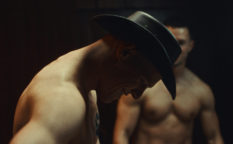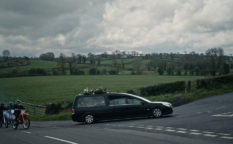Slak’s Vicious Cat Short Films
Hitting familiar notes, with characters positioned in a set up that ultimately teases things to come – this year’s Slak’s Vicious Cat winner for best short film at the Grossmann Fantastic Film and Wine Festival has all the makings of an epic tale and leaves the viewer wanting for more. The Haunted Swordsman, a supernatural samurai revenge story from American filmmaker Kevin McTurk, is an artful display of puppet mastery, eerie sceneries, and supernatural flair.
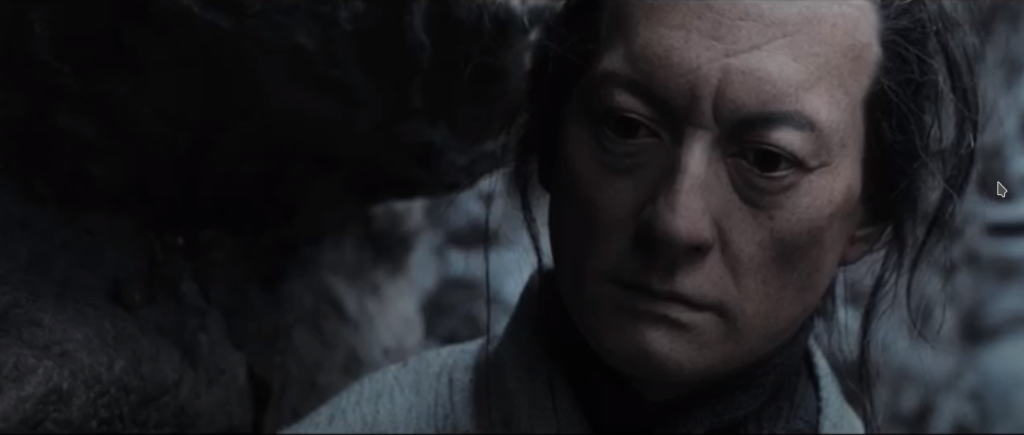
Produced amongst others by puppet pioneer Jim Henson’s daughters Lisa and Heather, McTurk employs the same old school techniques as Henson’s workshop. One-meter high bunraku puppets master their way through an array of traditional in-camera effects and smoke and mirror trickery. The result is a wondrous trip into a dark and mysterious world filled with tactile and nostalgic qualities to its look.
Helmed by the impressive voice cast of Jason Scott Lee as the lone samurai, Christopher Lloyd as the cryptic black monk, Franka Potente as the flesh-eating Onibaba Witch and James Hong as the Navigator, a severed talking head, The Haunted Swordsman tells a tale of revenge, honor, and love.
A samurai sets out to kill a demon, the so-called soul stealer, who has killed a shogun at his temple during an attack. Outmatched against the supernatural powers of the demon, the black monk sends him on a quest to look for a supernatural sword. “Your world is steel and blood, but to defeat the demon, you need to enter a world beyond imagination,” he tells him, right before the demon’s minions attack.
This first quest is only a stepping stone though. The feeling of being deprived of a second and third act is deliberate. McTurk has designed this first chapter of his story as a stand-alone tale. If given the funding, more chapters will be filmed.
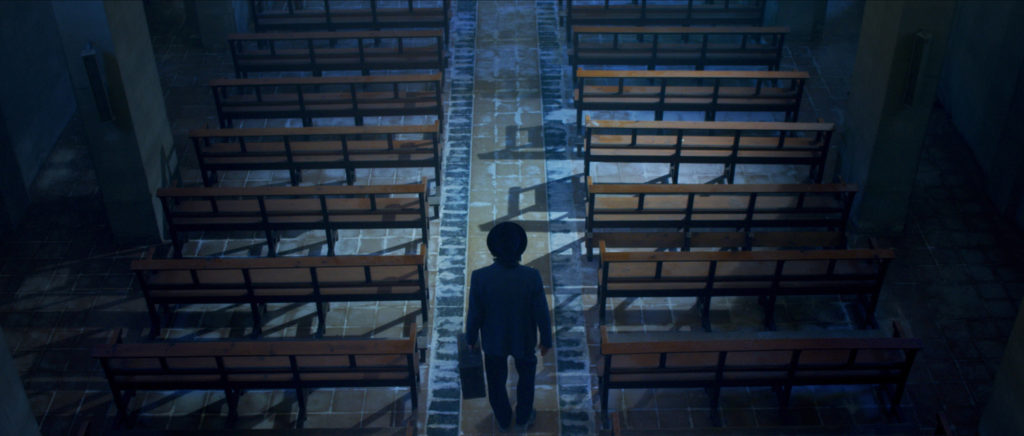
Film still from Marc Carreté’s “The Spiritualist”. Courtesy of Screenanarchy 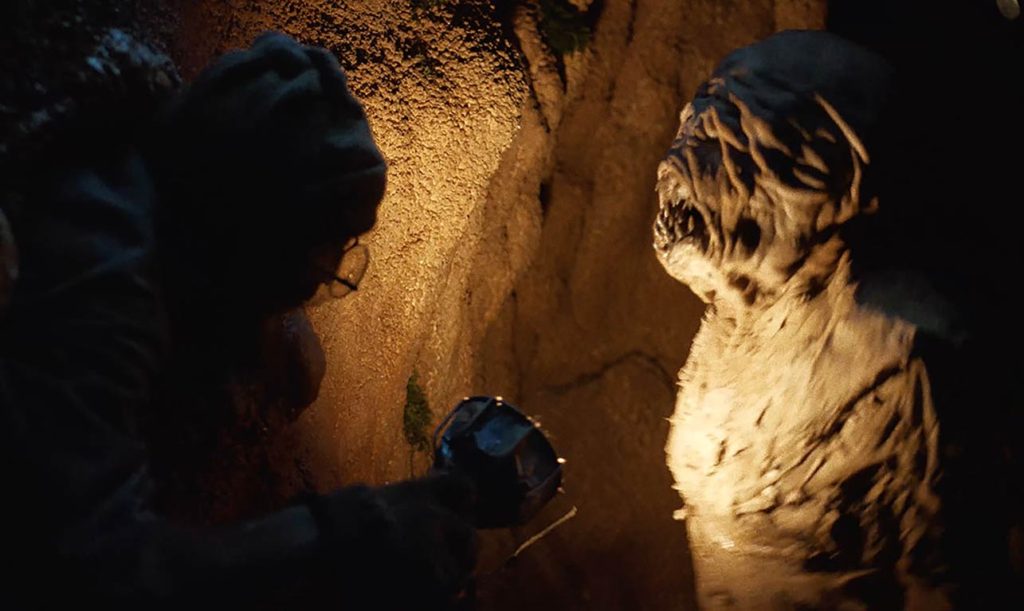
Film Still from Gregory Schultz’s Night Crawl. Courtesy of Festival of Fear
A similar opening act quality can be found in the Spanish El Espiritista directed by Marc Carreté. It tells the story of Santiago, who arrives in a small rural town to investigate a supernatural entity causing horror to a young mother and her child. With all the necessary ingredients present to marry the looks of ‘The Exorcist’ and the ‘The Conjuring’, it seems like the perfect setup for a showdown between the church and the demon. But the story only teases this option during a séance, with the creature welcoming the priest to town.
Maybe there is a certain realism hidden in here. Can the viewer logically expect that in every incarnation of the genre, the protagonist escapes the clutches of the entity while others fall prey to it? “El Espiritista” doesn’t outright answer this question, it just confirms the assumption that there is a danger to this ghost with the obligatory horrible backstory.
Director Gregory Schultz’s short Night Crawl toys with the idea of what could be worse than being stuck on death row. His answer – a terrifying monster living in the tunnels below the prison, waiting to feed on its next victim. Schultz’s focus is less on unraveling a detailed plot but on the delivery of a fine exercise in style and camerawork.
Like many of the shorts in this year’s competition, he takes his visual cues from decades past, encasing his pictures in soft blue diffused light and rich details of the prisoners and the dirty tunnels around them. The evil supernatural being is a given to the formula and doesn’t come as a surprise. The real artistry is the devastating sense of claustrophobia that Schultz manages to emulate with the camerawork.
Equally sinister is the Persian short Malakout (Divinity) directed by Farnoosh Abedi, a puppet monster story that is reminiscent of the golden age of monsters during the 30s. The elements are familiar: skewed angles, eerie decorations, a piano in the middle of the room, played as an expression of inner turmoil. Separated into four chapters, it tells not through dialogue, but through the horrid expressions of the puppets the story of a man whose dead female companion is reawoken by a ghoulish monk. In return, he loses his hands, only to receive a pair of mysterious transplants. These Frankenstein-like hands have a life and a sinister motivation of their own, as the couple soon has to figure out.
A bit more dark humored are the approaches of Landgraves and Central Dental. Landgraves, directed by Canadian Jean-François Leblanc, features a music journalist who interviews a French-Canadian heavy metal band in the middle of the woods in their recording studio, only to get stuck for the night. The band members, however, had previously been to prison due to manslaughter, stabbing a drummer during a photoshoot for their new album. This creates an offset uneasiness that is only reinforced by the dead-pan expression on the character’s faces.
While the setting of the remote cabin appears quite somber, director Jean-François Leblanc plays only with reduced supernatural elements, making the viewer question if there is darker truth to the band or if journalist Jérémie is hallucinating. Questions that float around until they are turned upside down in the final twist.
Lindsay Thomas Robinson‘s Central Dental is the symbiosis of a classic B Movie and German expressionistic influences. A young man wants to get his knocked-out tooth fixed in a suspiciously empty and uncanny dental clinic. The skewed angles, uneasy setting, and the hollow hallways in which shadows automatically multiply in size suggest that, by the book, he might soon get experimented on. But that is not the case. The doctor in her spartan office repairs the tooth. The real threat, however, is lurking somewhere else.
The Legacy by the French director Pierre-Alexandre Chauvat, on the other hand, abandons the more dark and dramatic tones of its source material, the American Western. The short film, which got a special mention by the Slak’s Vicious Cat jury, may employ some dark overtones of sexual abuse and rape, but plays more to the tropes of the genre with a twisted sense of humor.
A lone gunslinger named Arthur Richardson, who didn’t want this job to begin with but was pushed into it by the family, rides into town to apply for the position of sheriff. The local sheriff, a mean troublemaker named Bill Sherman, of course, has a problem with this. The climax: the obligatory showdown in the town’s bar, including strong spirits and a frightened man on the piano.
The twist in the story unravels itself long before the showdown. But that is not the main selling point of the short. Chauvat knows how to play with this setting and the viewer’s expectations. Richardson is more of a comedian than the second coming of Clint Eastwood or Henry Fonda, the horny major rambling away upstairs becomes a recurring joke to the enemies kept at bay. Even the obligatory shoot out plays with the clichés of the genre. In Arthur Richardson’s world, you can actually run out of the bullets.
Even more playing to its absurdity, incorporating modern cultural bones of contention, is the Israeli Dead End by Nir Berger, a short TV show about two teenagers looking for the girl’s missing brother in the wasteland of a nuclear holocaust. Sprinkled with fine gallows humor, it employs themes of self-deprecating and satirizing the status quo. The story revolves less about the drama of a post-apocalyptic world but enables the makers to put the finger on societal trends and issues, such as a naive higher moral of veganism or the trivialization of sexual harassment.
Expect the unexpected. In many ways, Grossmann’s selection of shorts defies the laid-out narrative or utilizes it to translate it into stunning visualizations. There is more to the formula that can be found repeatedly in full-length features but should be reexamined whenever the chance presents itself. These are shorts that, in tune with Grossmann’s mission statement, dip into the fantastic, frightening, fierce, and transgressive outside the usual conventions.

